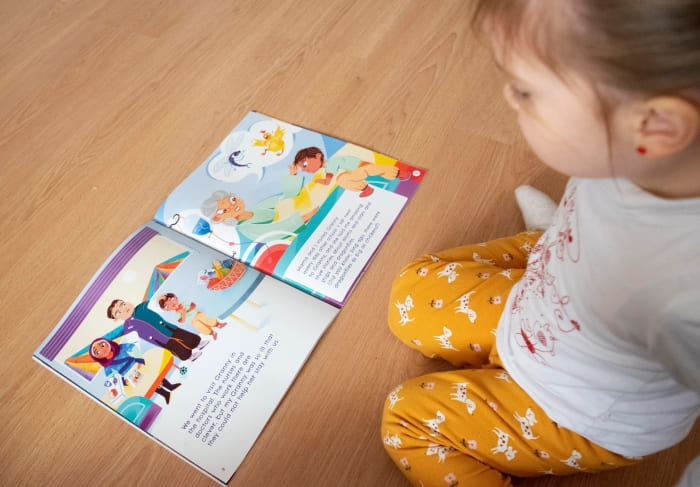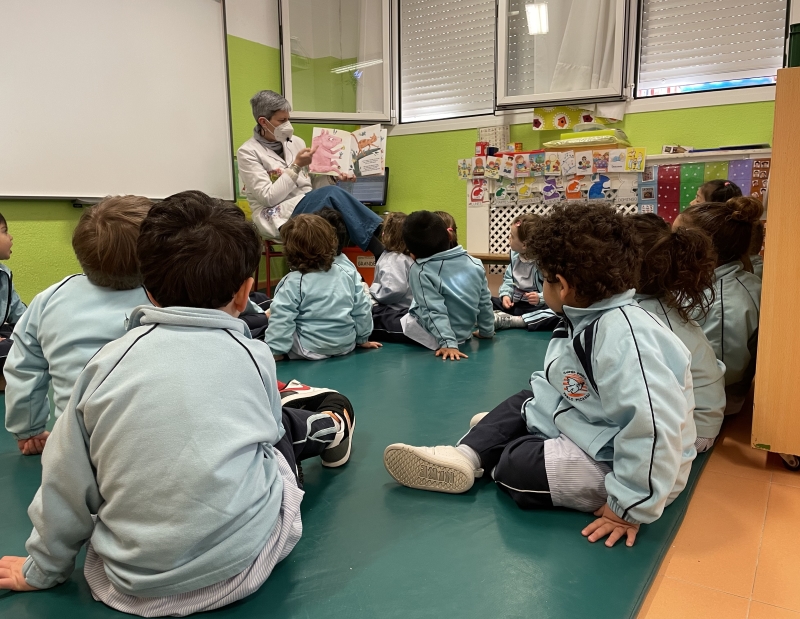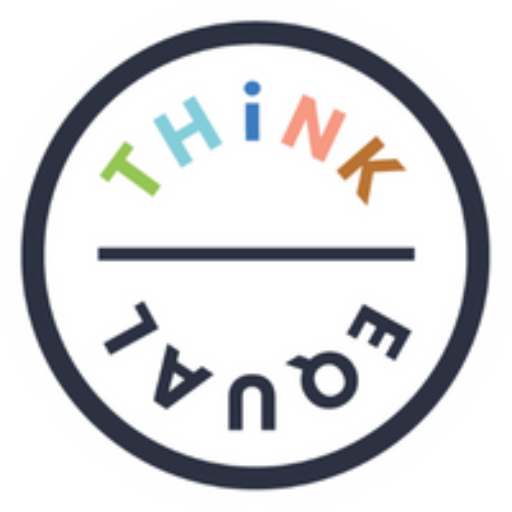“The most important period of life is not the age of university studies, but the first one, the period from birth to the age of six.”
– MARIA MONTESSORI

“What happened to my granny?” Think Equal Level 3 book, illustrated by Carmen Sánchez and written by Deshan Tennekoon.
As the pandemic has spread globally since 2020, this public health crisis has brought significant and unexpected social, emotional and psychological consequences for many. There has been particular concern regarding its effects on young children’s mental health and Social and Emotional Development due to them being more vulnerable to the ramifications of the international crisis. (Walker, 2020). At Think Equal, we also believe it affects the youngest children disproportionately because the ages of 0 to 6 are arguably the most influential years of a human being’s life from a developmental point of view. When this development window is interrupted or even arrested, as we believe has been the case in very young children, the consequences can be far-reaching and even as serious as “a lost generation” who may never catch up.
These unprecedented events caused by the pandemic have adversely affected children in a way that has caused educational researchers to express concerns for their long-term social and emotional health and well-being (Walker, 2020). International government regulations for lockdowns and school closures have delayed young children’s educational progress. Children experienced social isolation ranging from limited or no contact with their peers, poor social skills, lack of daily physical activity to feelings of overwhelm. This has led to increased levels of restlessness, increasing anxiety and stress levels, increased anger and profound sadness. As education classes were structured online, this also negatively impacted their concentration levels. Many children missed out on the immersive educational classroom experience, and the connection between the child and teacher has been greatly disrupted (Walker, 2020). This has also limited the teachers’ ability to understand the child’s needs fully and to respond accordingly to situations such as learning difficulties, familial/household conflict or lack of online education. As the pandemic has subsided, we now have a generation of young children requiring much-needed learning support to recover from its effects. But we must ensure we do not focus solely on this aspect of the gap and also consider the critical (and it might be argued more urgently needed) psycho-social, relational and emotional support.
How can we help young children recover from COVID-19?
Think Equal founder, Leslee Udwin, understands and advocates the importance of Social and Emotional Learning in young children being taught alongside numeracy and literacy. Neuroscientists have stated that the optimal time to change mindsets, attitudes and behavior is before the age of six.
The Think Equal (SEL) program teaches various critical skills that are instrumental in shaping children’s social and emotional growth. These skills can influence their perspective and responses to their environment positively.
Five Distinct skills, detailed below, have been identified as vital for the intervention in the recovery of social and emotional learning deficits in young children resulting from COVID-19.
1. Empathy
Empathy is a taught skill to understand conflict and others’ emotional points of view, leading to positive, kind behaviors. As classroom access was restricted, children lacked the necessary group environment, which would have enabled them to learn the perspective of others and witness the experiences of others, and develop empathetic skills, resulting in “issues with sharing, being over-excited and turn-taking” (Hall, 2022).
2. Inclusion and Celebration of Diversity
Inclusion teaches children the ability to recognize and appreciate the rights, beliefs and differences of others, which leads to a celebration of the uniqueness of everyone, a celebration of their diversity and a greater sense of self-esteem, awareness and understanding of themselves. Due to classroom restrictions, experiences of diverse individual/social dynamics became limited, causing children’s autonomy and perspective to be confined – resulting in “unaware and self-centered behaviors” (Campbell, 2021).
3. Emotional regulation
Emotional regulation is necessary for children to identify and modulate their emotions as they experience and express them. Children learn boundaries and social cues from the world around them in a familiar, structured and safe environment, but as government guidelines changed daily through the pandemic, this contributed to the disruption of emotional regulation and effective communication skills (Campbell, 2021).
4. Decision-making
Decision-making is widely understood to have been restricted during the pandemic, directly impacting young children. Difficulties like mask-wearing, social distancing, and ever-changing government guidelines increased children’s anxiety and stress levels during their formative decision-making years (Guynup, 2021).
5. Resilience
Resilience is the ability to process and adapt to adversities. Unforeseen changes, often overnight, challenged young children’s ability to develop this necessary skill. Nurturing resilience during a pandemic is vital for reducing children’s psychosocial problems, anxiety and depression (Tso, et al., 2022). Positive resilience reinforces healthy self-esteem, adaptability and effective healthy relationships; all taught in the SEL program.
A solution: The Think Equal Program

Think Equal Program implementation in Spain through Fundación Gomaespuma.
This initiative is currently implemented in over 22 countries worldwide, and two of those as part of the national school curriculum for every child in those countries. As an evidenced-based, replicable and scalable program, it delivers a powerful foundation to build pro-social neuropathways in early development, ensuring positive lifelong outcomes.
It is necessary skills like these and more that are translated within the Think Equal (SEL) program to bring forward new concepts and understandings of adverse childhood experiences, such as the global pandemic. This holistic approach to education and Social and Emotional Learning will undoubtedly support young children’s development whilst recovering from the effects of COVID-19. The Think Equal (SEL) program inculcates the teachings of these important Social and Emotional Learning skills that enable children to not just survive through life but to thrive exponentially and beyond.
It is no coincidence that the region-wide rollout of the programme across the Greater Manchester region has been co-funded with the NHS.
Download our COVID-19 book and resources, and order the Think Equal program below:
References
Tso, W., Wong, R. S., Tung, K., Rao, N., Fu, K. W., Yam, J., Chua, G. T., Chen, E., Lee, T., Chan, S., Wong, W., Xiong, X., Chui, C. S., Li, X., Wong, K., Leung, C., Tsang, S., Chan, G., Tam, P., Chan, K. L., … Lp, P. (2022). Vulnerability and resilience in children during the COVID-19 pandemic. European child & adolescent psychiatry, 31(1), 161–176.


Leave a Reply